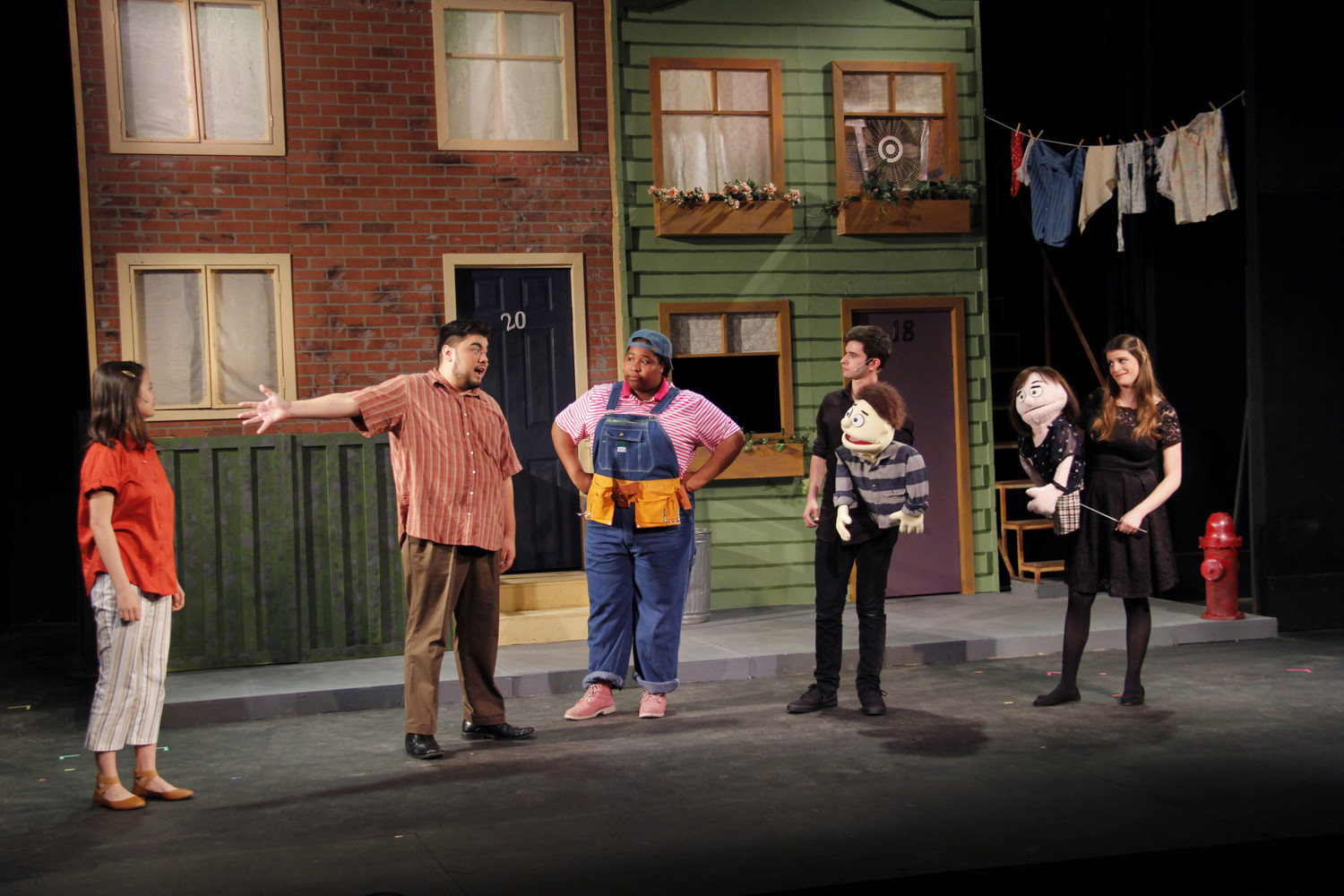Review: AVENUE Q at Conejo Players Theatre

In a world that is consumed by political correctness, Avenue Q, which made its debut at the Conejo Players Theatre May 3 for a brief two-weekend run, shatters Broadway conventions with its refreshing and often uproarious view of issues that face young adults living on their own. It's done through the prism of a musical satire of Sesame Street, using Muppet-like hand puppets smoothly manipulated by non-concealed actors. CPT's production features a perfect cast of eight young actors skillfully directed by Jeremy Zeller. Avenue Q won three Tony Awards in 2004 for Best Musical, Book and Score.
Leo Zeller did a marvelous job in creating the puppets, with the two leads, Kate Monster and Princeton especially resembling the two exceptional actors who portray them. For Meagan Chew, playing kindergarten teaching assistant Kate Monster has been a dream role. The former Westlake High School graduate's performance is highlighted by a tender rendition of the Act I closer, "There's a Fine, Fine Line," one of the many deceptively profound songs in Robert Lopez and Jeff Marx's sunny score.
The talented young actor Aaron Ellis makes his CPT debut doubling as Princeton, the college graduate looking for purpose in his life, and Rod, a self-doubting investment banker who questions his sexuality and is prone to hysterical outbursts. Ellis has managed to give each character distinctive vocal characterizations in a show that often features doubled performances.
Underneath its broad comedy, which includes R-rated language and a scene where puppets do things you'd never see on Sesame Street, Avenue Q delivers important messages concerning personal relationships and discrimination against people who are different, with regard to race, sexual orientation and homelessness. Songs like "Everyone's a Little Bit Racist" and "If You Were Gay" attack these issues with humor, but there are also some serious and touching moments, including "I Wish I Could Go Back to College," in which Kate Monster, Princeton and their friend Nicky (Noah Terry) look back wistfully on their last years of innocence and security within the confines of a college community.
Kate Monster and Princeton's friends on Avenue Q include Christmas Eve, a snippy Japanese behavioral therapist, played by Newbury Park High School senior Lexie Collins, who sings one of the most affecting performances in the show, "The More You Ruv Someone." Collins' character deliberately exaggerates Japanese speech patterns, but Collins does it in a charming way and her performance is one of the show's best.
Noah Terry proves his versatility by playing multiple roles, including Rod's slacker roommate Nicky, the gravelly-voiced, porn-loving Trekkie Monster, and, with Dana Devitt, one of the Bad Idea Bears, two cuddly teddy bears who delight in dispensing sinister advice. Sahai Lara is great as down-on-his-luck former child actor Gary Coleman, a role cast for a woman; she leads the way on "Schadenfreude," which reveals how satisfying it is sometimes to experience the failure of others.
Megan Rowsey is outstanding as Lucy The Slut, a predatory nightclub vixen who seeks and destroys any unsuspecting male in her path, while Vincent Paz-Macacreno does a fine job as Christmas Eve's henpecked, unemployed fiancé Brian.
The production crew includes Dominick Riches' sharp-eyed lighting, Leo Zeller's solid set construction, and the excellent vocalizations, credited to music director Benjamin Glasner. A number of video projections, signifying dreams and aspirations of the characters, are also effectively used. On opening night, the various sound effect cues perfectly synchronized with the actions on the stage, showing the effect of careful, methodical rehearsal. The topically relevant script allows for leniency with regard to mentions of certain political personages, especially in the final song, "For Now." To paraphrase one of the songs, if you don't see this terrific show, "it will suck for you."
Videos
